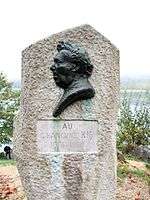Félix Kir

Canon Félix Kir (January 22, 1876 - April 26, 1968) was a French Catholic priest, resistance fighter and politician.
He was born at Alise-Sainte-Reine on the Côte-d'Or. He entered a small seminary at Plombières-lès-Dijon in 1891 and was ordained 1901. He then worked as a parish priest. During the occupation of France during World War II, he took an active part in the French Resistance, helping with the escape of 5,000 prisoners of war from a camp at Longvic. He was arrested and condemned to death, but he was released because of his status. He continued organising operations, and was seriously wounded, but escaped interrogation by the Gestapo.
In 1945 he was made a knight of the Légion d'honneur and was elected mayor of Dijon and to the French National Assembly. He remained mayor of Dijon up to his death.
A local drink, then locally known as 'blanc-cassis,' consists of white burgundy wine, traditionally Aligoté, mixed with Crème de Cassis, a sweet, blackcurrant-flavored liqueur. Kir habitually served this local drink to delegations and so the drink itself is now known internationally as Kir.[1][2][3] Alternately, some contend that German soldiers confiscated most of the regions red wine, so Kir converted a local brew of red wine and Creme de Cassis into a White and Creme combination, creating the drink.
An artificial lake built to the west of Dijon was also called Lac Kir. (47°19′40″N 4°59′56″E / 47.32778°N 4.99889°E)
References
- ↑ Dale DeGroff, The Essential Cocktail: The Art of Mixing Perfect Drinks (Random House Digital, Inc., 2008).
- ↑ "Sherry-Lehamnn Reports on the Apéritif Hour," New York Magazine, Oct 23, 1972. Vol. 5, No. 43, p.45.
- ↑ A. J. Rathbun, Wine Cocktails: 50 Stylish Sippers That Show Off Your Reds, Whites, and Roses (Houghton Mifflin Harcourt, 2009).
| Wikimedia Commons has media related to Félix Kir. |
|